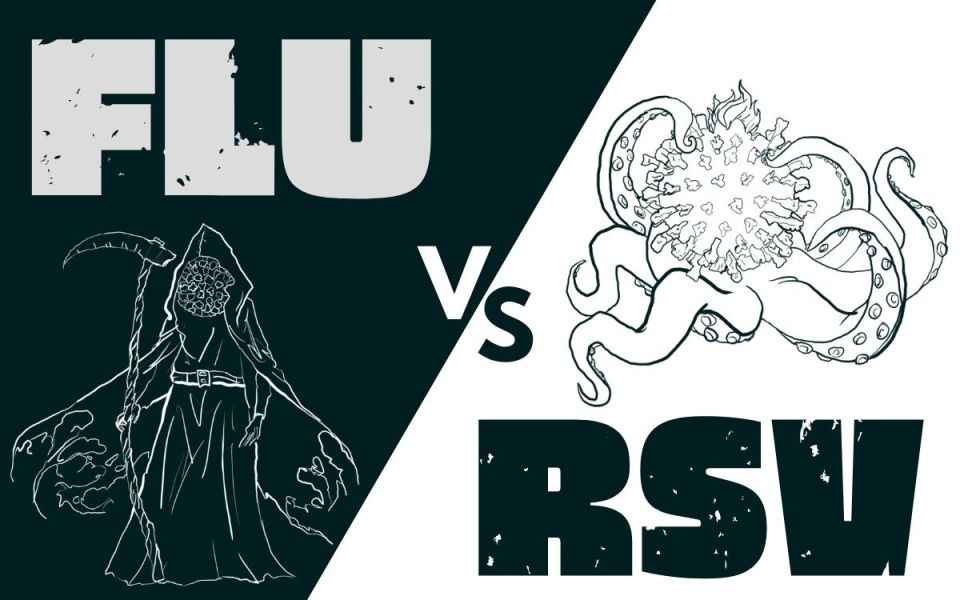Flu vs. RSV: Vaccines, Symptoms, and Prevention Tips for the Season Ahead

With flu season approaching, it’s time to clear the air. What’s the difference between the flu, which we get a vaccine for yearly, and RSV?
Influenza (flu) and respiratory syncytial virus (RSV) are respiratory infections caused by different viruses. Influenza viruses, primarily types A and B, cause the flu. These viruses mutate frequently, which is why we update flu vaccines annually. Symptoms of the flu typically include sudden onset of fever, chills, muscle aches, cough, sore throat, and gastrointestinal issues like nausea. The flu can affect people of all ages but tends to be more severe in young children, older adults, pregnant women, and those with chronic health conditions. Flu outbreaks typically occur in the fall and winter months, which we call flu season.
Respiratory Syncytial Virus (RSV) is a common virus infecting the lungs and respiratory tract. Symptoms range from mild and cold-like - such as runny nose and cough - to more severe lower respiratory tract infections- like bronchiolitis and pneumonia, especially in infants and older adults with compromised immune systems. In extreme cases, RSV can progress to lower respiratory tract disease (LRTD). RSV infections in the U.S. largely start during the fall and peak in the winter.
Both viruses spread through respiratory droplets from coughing and sneezing and can survive on surfaces for several hours, contributing to their contagiousness. Measures for stopping the spread of both include frequent handwashing, avoiding close contact with sick individuals, and staying home when symptoms are noticed. For decades, yearly flu vaccinations have helped mitigate the risk of influenza, with options available since the 1940s. In contrast, RSV vaccines have only recently become available following FDA approvals in 2023 and 2024:
- May 2023 - Arexvy, developed by GSK, is the first RSV vaccine approved for preventing lower respiratory tract disease (LRTD) caused by RSV in individuals 60 and older. In June 2024, the FDA approved Arexvy for adults 50-59 who are at increased risk of RSV.
- July 2023 - Nirsevimab, developed by AstraZeneca and Sanofi in partnership, is a monoclonal antibody that helps prevent lower respiratory tract disease (LRTD) and is approved for children under eight months for their first RSV season.
- August 2023 - Abrysvo, developed by Pfizer, is the first vaccine approved for use in pregnant individuals 32 through 36 weeks to prevent LRTD caused by RSV in infants from birth through 6 months of age.
- May 2024, mRESVIA, developed by Moderna, is the second RSV vaccine approved by the FDA to protect adults aged 60 years and older from LRTD caused by RSV.
Most people can recover from the flu and RSV at home; however, special care should be given to infants, pregnant people, and older adults. At-home treatment for both illnesses focuses on rest, hydration, and symptom management. Patients can use over-the-counter medication such as acetaminophen (Tylenol) or ibuprofen to reduce fever or aches.
Participating in clinical trials for the flu and RSV vaccines is crucial to advancing medical knowledge and contributing to public health. Understanding the differences between the flu and RSV is the key to staying healthy all year round!
Written by: Manogna Chandra, 2024 Intern, ENCORE Research Group
Click Below for ENCORE Research Group's Enrolling Studies
References
National Foundation for Infectious Diseases.(n.d.). How to tell the difference between flu, RSV, COVID-19, and the common cold. [Website]. https://www.nfid.org/resource/how-to-tell-the-difference-between-flu-rsv-covid-19-and-the-common-cold/
MercyOne. (n.d.). Is it COVID-19, the flu, or RSV? [Website]. https://www.mercyone.org/health-and-wellness/health-answers/covid-19-what-you-need-to-know/covid-19-blogs/is-it-the-flu-or-a-cold
Dartmouth Health. (2024, February 2). How do you know if you have COVID-19, flu, or RSV? [Website[. https://www.dartmouth-hitchcock.org/stories/article/how-do-you-know-if-you-have-covid-19-flu-or-rsv
U.S. Food & Drug Administration. (2024, August 7). Respiratory syncytial virus (RSV). https://www.fda.gov/consumers/covid-19-flu-and-rsv/respiratory-syncytial-virus-rsv


